Take the First Step For Estimate!
- Accurancy
- Efficiency
- Transparency
- Customization
- Time Saving
- Professionalism
- Cost Control
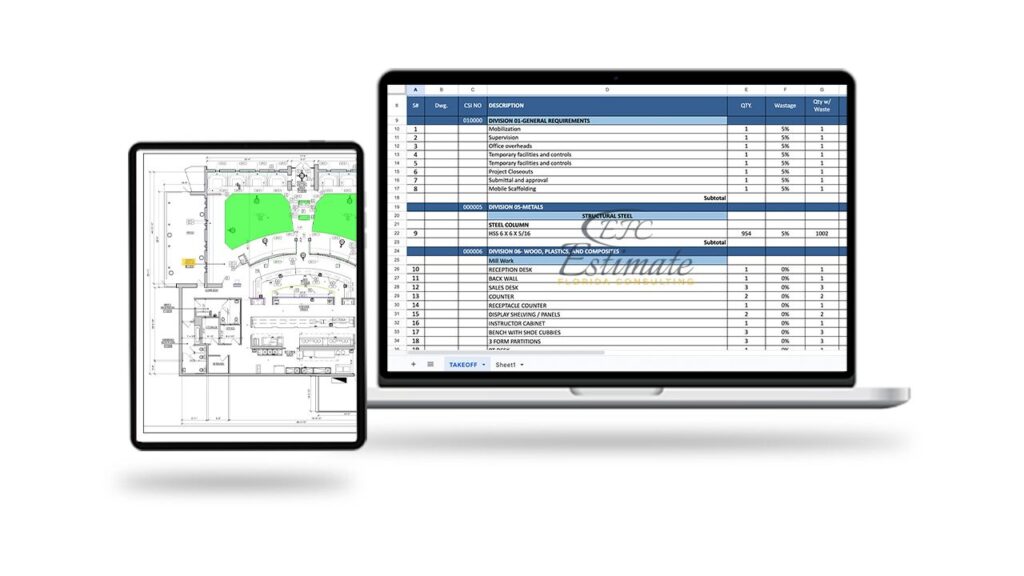
Estimate Florida Consulting excels in delivering precise estimates customized specifically for modified bitumen roofing projects designed for hotel buildings. The total cost for modified bitumen roofing for hotel buildings could range from $20,000 to $150,000 or more, depending on the specific needs and specifications of the project.Our specialized expertise ensures meticulous assessments, taking into account crucial factors like membrane type, installation technique, and labor expenses. Trust us to provide accurate and detailed estimates that meet the unique requirements of your hotel roofing project with precision and reliability.
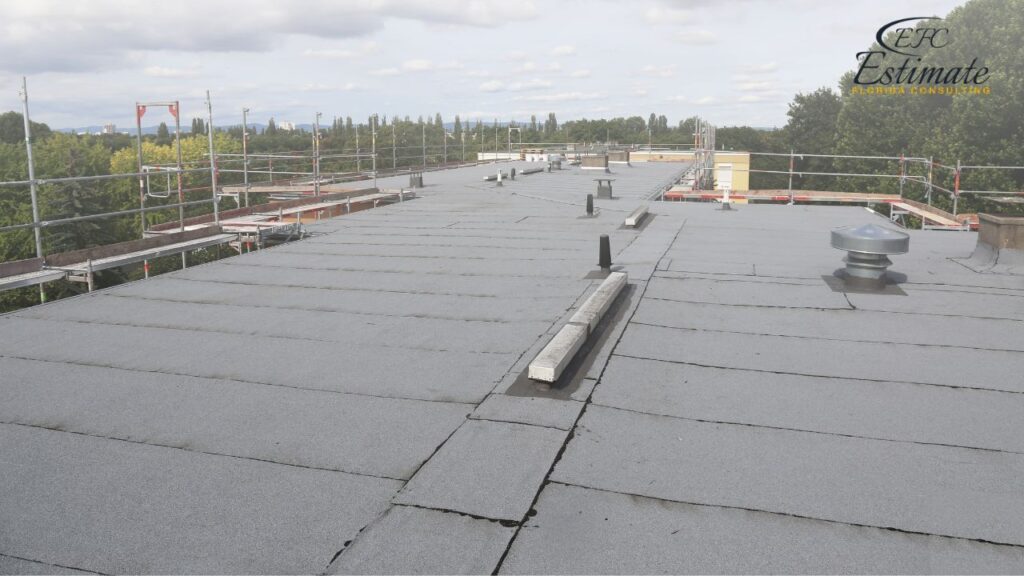
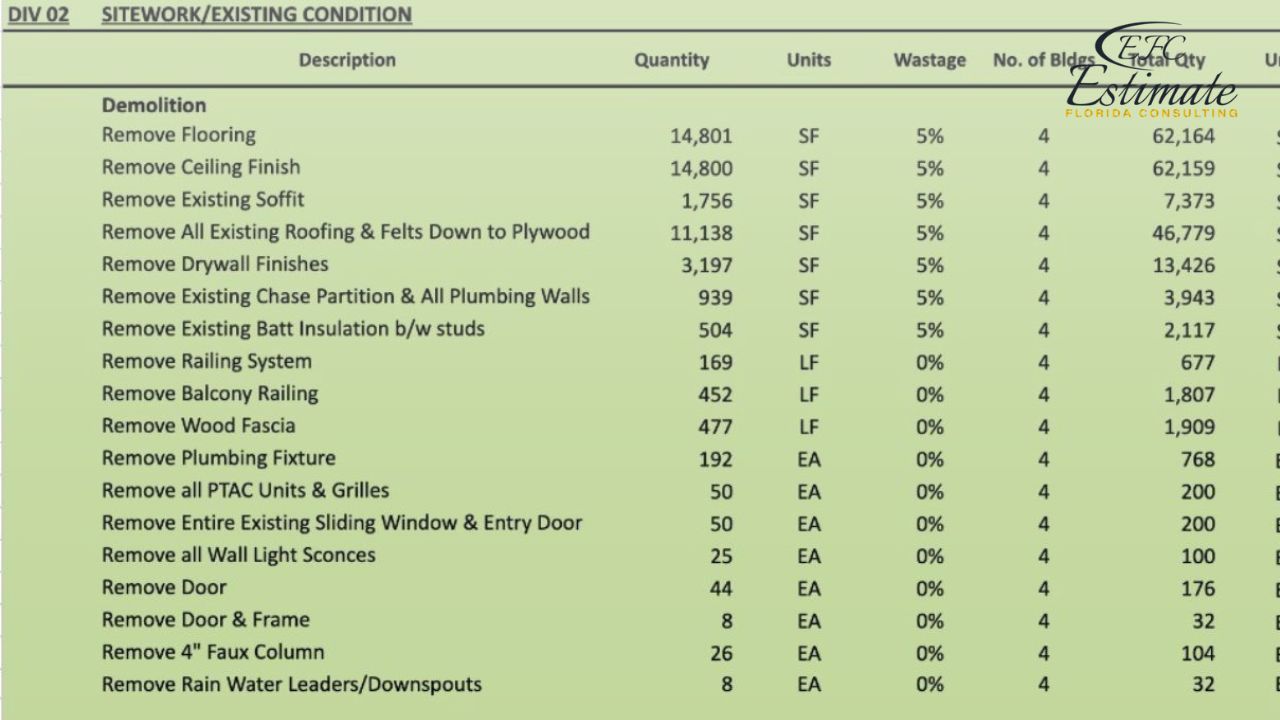
ZIP Code Based Estimate
Highly Accurate
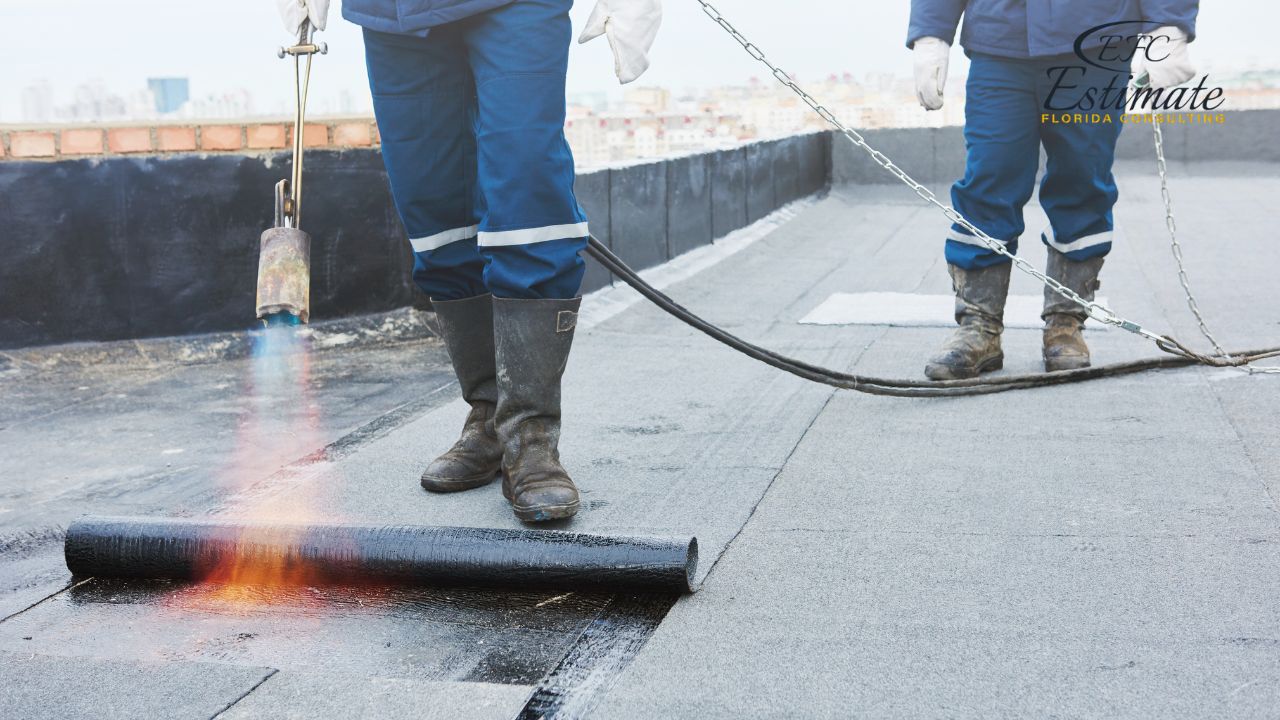
Fully Insured License Hire Sub-Contractor For Hotel Buildings Modified Bitumen Roofing
Hire Contractor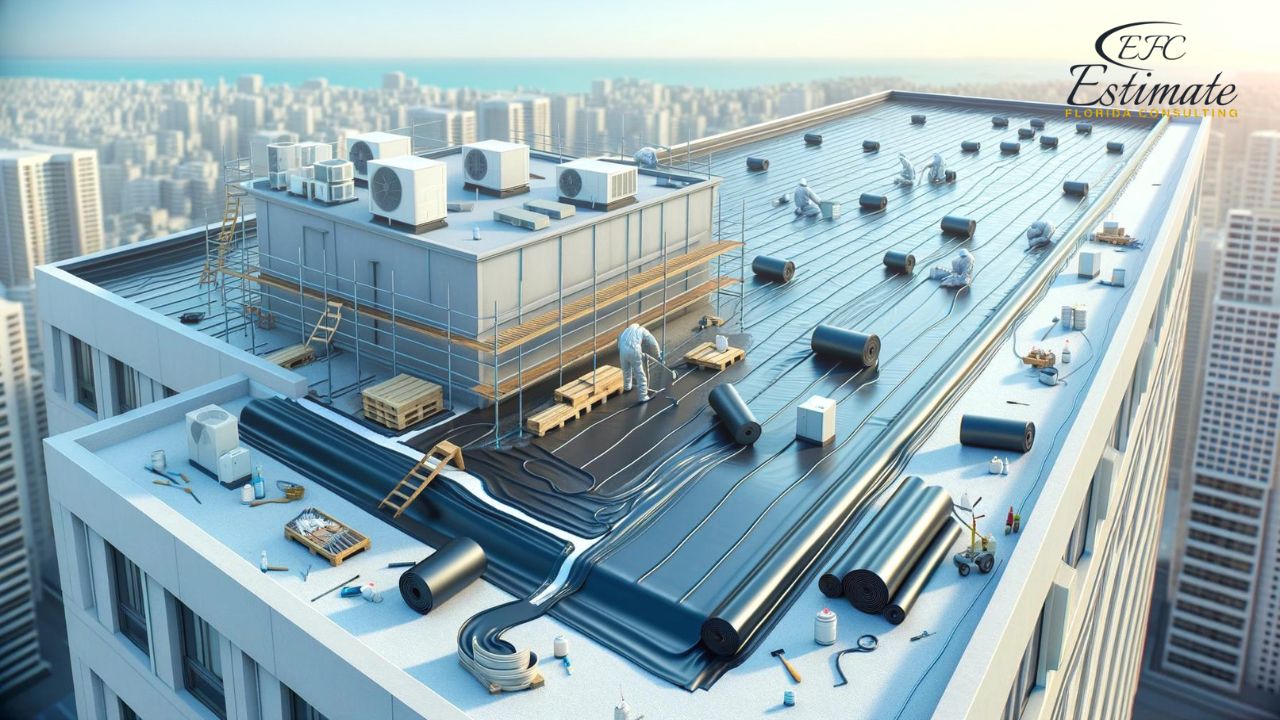
Make Informed Design Decisions Showcase Your Design Ideas
Get RenderingModified bitumen roofing costs can vary based on factors such as the type of installation, membrane type, and roof size. Below is an average cost breakdown for modified bitumen roofs:
Membrane Type | Cost Range |
APP (Atactic Polypropylene) | $3.50 – $6.50 per sq ft |
SBS (Styrene-Butadiene-Styrene) | $4.50 – $7.50 per sq ft |
Installation Type | Cost Range |
Torch-Applied | $2.50 – $4.50 per sq ft |
Peel-and-Stick (Self-Adhered) | $3.50 – $6.50 per sq ft |
Labor Type | Cost Range |
Installation Labor | $2.00 – $4.00 per sq ft |
Roof Deck Preparation | $1.00 – $2.50 per sq ft |
Additional Cost | Cost Range |
Insulation | $1.00 – $2.00 per sq ft |
Flashing and Trim | $500 – $1,500 |
Roofing Accessories | $300 – $800 |
Modified bitumen roofing offers a reliable and durable solution for hotel buildings, providing protection against the elements while accommodating various architectural designs. From small boutique hotels to expensive resorts, modified bitumen roofing can be tailored to suit the needs of each establishment, ensuring long-term performance and peace of mind for hotel owners.
Cost Category | Cost Range |
National Average | $4 – $7 per sq ft |
Typical Price Range | $3 – $8 per sq ft |
Extreme Low-End Cost | As low as $2 per sq ft |
Extreme High-End Cost | $10 or higher per sq ft |
Hotel Size | Cost Range |
Small Hotel | $20,000 – $50,000 |
Medium Hotel | $40,000 – $80,000 |
Large Hotel | $70,000 – $120,000 or more |
Note: The cost ranges provided are estimates and can vary based on factors such as location, specific project requirements, installation complexity, and the chosen modified bitumen type. Additional expenses related to structural modifications, insulation, and underlayment should be considered in the overall budget.
The size and complexity of a roof play a pivotal role in determining the installation costs of modified bitumen roofing systems. Larger roofs necessitate more materials and labor, inherently escalating overall project costs. Additionally, roofs with intricate designs or architectural complexities often require specialized installation techniques and greater attention to detail, contributing further to the complexity of the project. Such intricacies demand more time and expertise, leading to increased labor costs. In essence, the scale and intricacy of the roofing structure directly influence the quantities of materials and labor hours, thereby influencing the overall installation expenses.
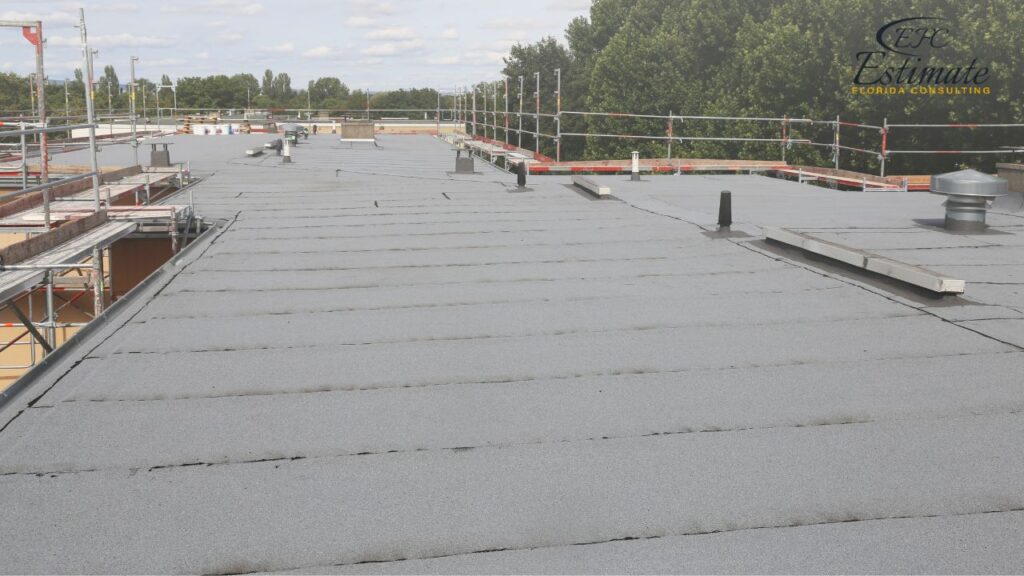
The choice between APP (Atactic Polypropylene) and SBS (Styrene Butadiene Styrene) membranes is a critical factor influencing modified bitumen roof installation costs. SBS membranes are renowned for their elasticity and flexibility, providing enhanced durability and resistance to extreme weather conditions. On the other hand, APP membranes are often preferred for their increased resistance to ultraviolet (UV) radiation. The selection between these membrane types not only impacts the performance characteristics of the roofing system but also introduces variations in material costs. The specific requirements of a project and the desired properties of the membrane contribute to the overall cost dynamics.
The installation method chosen for modified bitumen roofing significantly affects labor requirements and associated costs. Two prevalent methods are torch-applied and peel-and-stick installations. Torch-applied methods involve the use of an open flame to adhere the membrane to the roof substrate, requiring skilled labor and specific safety measures. Peel-and-stick methods, on the other hand, offer a safer application, involving the removal of a protective backing to expose adhesive for membrane attachment. The selection between these methods depends on project specifications, safety considerations, and the expertise available. The method chosen influences the labor costs, safety precautions, and overall efficiency of the installation process.

The need for insulation is a crucial factor contributing to modified bitumen roof installation costs. Insulation is essential for enhancing energy efficiency, regulating indoor temperature, and complying with local building codes. The inclusion of insulation materials adds an extra layer of expense to the project. The specific insulation requirements are often dictated by local building regulations, climate considerations, and the intended use of the building. Proper insulation not only impacts the immediate installation costs but also contributes to long-term energy savings, making it a vital consideration in the overall cost assessment.
Compliance with local regulations and obtaining necessary permits is a non-negotiable aspect of modified bitumen roof installation and, consequently, a significant cost factor. Adhering to local building codes, safety standards, and environmental regulations ensures that the roofing project meets legal requirements. The process of obtaining permits may involve fees and additional documentation. Failure to comply with these regulations can result in legal consequences and may lead to additional expenses to rectify non-compliance issues. Therefore, a thorough understanding of and adherence to local regulations is indispensable in estimating and managing the overall installation costs.
One of the standout benefits of modified bitumen roofing for hotels is its exceptional durability. Engineered to withstand the rigors of diverse weather conditions, including exposure to UV radiation, hail, and high winds, these roofs offer a reliable and long-lasting solution for hotel structures. The robust nature of modified bitumen membranes provides hotel owners with the confidence that their investment in roofing will stand the test of time, contributing to the overall resilience and longevity of the building.
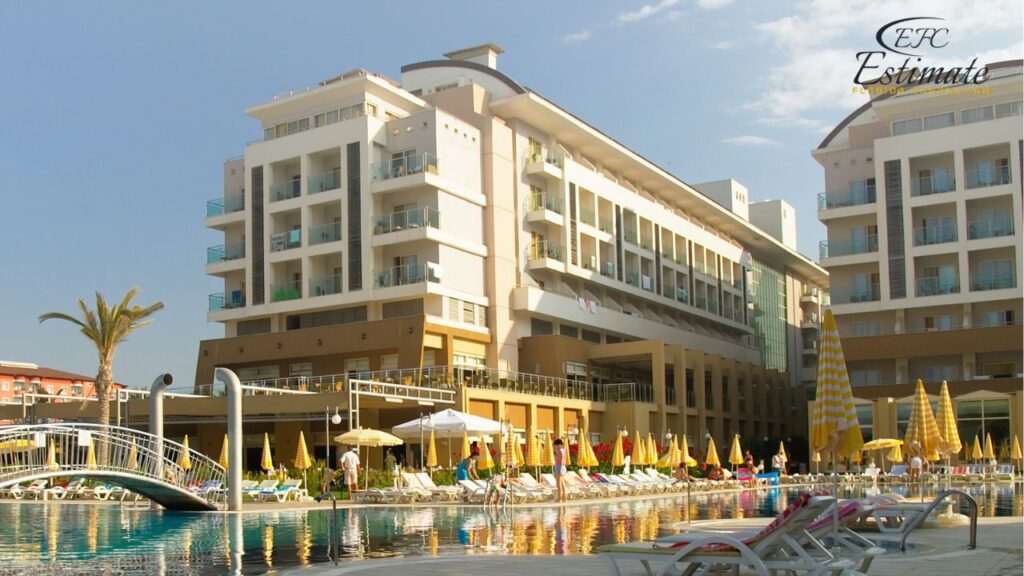
The flexibility inherent in modified bitumen roofing membranes is a key advantage, particularly when considering the diversity in roof structures found in hotels. This flexibility allows for easy installation on different roof configurations, ensuring a seamless and watertight roofing system. Whether the hotel has a flat roof, a low-slope design, or a structure with unique architectural features, modified bitumen roofing can adapt to varying requirements. This adaptability simplifies the installation process and enhances the overall effectiveness of the roofing system.
Modified bitumen roofs often come equipped with reflective coatings, contributing significantly to energy efficiency. The reflective surface of these roofing membranes helps reduce heat absorption, particularly in regions with intense sunlight. By minimizing heat transfer into the building, modified bitumen roofs assist in lowering cooling costs for hotels. This energy-efficient attribute aligns with sustainable practices and can lead to notable cost savings over the lifespan of the roofing system, making it an appealing choice for environmentally conscious hotel owners.
For hotel owners seeking a roofing solution with minimal upkeep requirements, modified bitumen roofs offer a distinct advantage. These roofs are relatively low maintenance, typically requiring periodic inspections and minor repairs. The ease of maintenance adds to the overall cost-effectiveness of modified bitumen roofing for hotels. Hotel management can allocate resources more efficiently, knowing that the roofing system in place demands fewer interventions, allowing them to focus on providing excellent guest experiences rather than dealing with constant roofing issues.
The versatility of modified bitumen roofing extends to the installation process, providing hotels with options to suit their specific project requirements and safety considerations. Hotels can choose between torch-applied and peel-and-stick (self-adhered) installation methods based on factors such as the roof structure, project timeline, and safety preferences. Torch-applied methods involve the use of an open flame to adhere the membrane to the roof substrate, while peel-and-stick methods offer a safer alternative by utilizing self-adhesive properties. This flexibility in installation options enhances the suitability of modified bitumen roofing for various hotel structures, allowing for customization based on the unique needs of each project.
The comprehensive guide on modified bitumen roofing for hotels provides valuable insights into the key factors influencing installation costs and highlights the numerous benefits associated with this roofing solution. The cost breakdown, estimates based on hotel size, and average costs per square foot offer practical considerations for hotel owners and managers. Modified bitumen roofing emerges as a durable, flexible, and energy-efficient option, with low maintenance requirements and versatile installation methods. The guide emphasizes the importance of understanding factors such as roof size, membrane type, installation method, insulation needs, and compliance with local regulations in estimating and managing overall installation costs. Ultimately, the versatility and performance of modified bitumen roofing make it a reliable and cost-effective choice for hotels, contributing to the long-term resilience and functionality of their buildings.
The cost varies based on factors such as membrane type, installation method, labor expenses, and roof size.
The national average ranges from $4 to $7 per square foot, with typical prices ranging from $3 to $8 per square foot.
The extreme low-end cost can be as low as $2 per square foot, while the high-end cost can be $10 or higher per square foot.
Small hotels may incur costs between $20,000 to $50,000, medium hotels $40,000 to $80,000, and large hotels $70,000 to $120,000 or more.
Our specialized expertise ensures accurate assessments and detailed estimates tailored to the specific needs of hotel roofing projects, providing precision and reliability for your roofing endeavors.
Here I am going to share some steps to get your modified bitumen roofing cost for hotel buildings estimate report.
You can send us your plan on info@estimatorflorida.com
Before starting your project, we send you a quote for your service. That quote will have detailed information about your project. Here you will get information about the size, difficulty, complexity and bid date when determining pricing.
Our team will takeoff and estimate your project. When we deliver you’ll receive a PDF and an Excel file of your estimate. We can also offer construction lead generation services for the jobs you’d like to pursue further.



561-530-2845
info@estimatorflorida.com
Address
5245 Wiles Rd Apt 3-102 St. Pete Beach, FL 33073 United States
561-530-2845
info@estimatorflorida.com
Address
5245 Wiles Rd Apt 3-102 St. Pete Beach, FL 33073 United States
All copyright © Reserved | Designed By V Marketing Media | Disclaimer